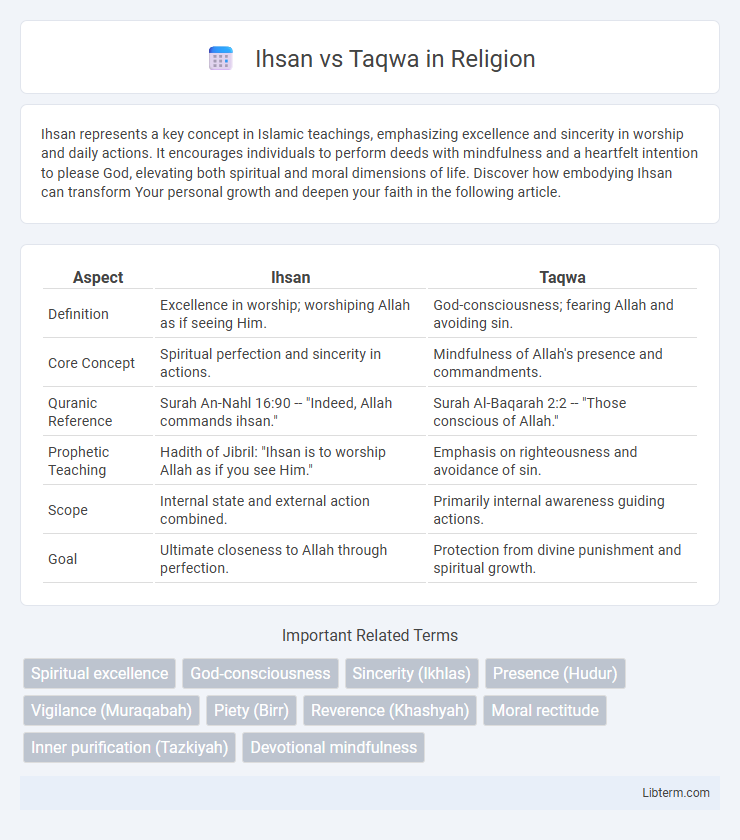Ihsan represents a key concept in Islamic teachings, emphasizing excellence and sincerity in worship and daily actions. It encourages individuals to perform deeds with mindfulness and a heartfelt intention to please God, elevating both spiritual and moral dimensions of life. Discover how embodying Ihsan can transform Your personal growth and deepen your faith in the following article.
Table of Comparison
| Aspect | Ihsan | Taqwa |
|---|---|---|
| Definition | Excellence in worship; worshiping Allah as if seeing Him. | God-consciousness; fearing Allah and avoiding sin. |
| Core Concept | Spiritual perfection and sincerity in actions. | Mindfulness of Allah's presence and commandments. |
| Quranic Reference | Surah An-Nahl 16:90 -- "Indeed, Allah commands ihsan." | Surah Al-Baqarah 2:2 -- "Those conscious of Allah." |
| Prophetic Teaching | Hadith of Jibril: "Ihsan is to worship Allah as if you see Him." | Emphasis on righteousness and avoidance of sin. |
| Scope | Internal state and external action combined. | Primarily internal awareness guiding actions. |
| Goal | Ultimate closeness to Allah through perfection. | Protection from divine punishment and spiritual growth. |
Understanding Ihsan: The Pinnacle of Faith
Ihsan, defined as worshiping Allah as though seeing Him, represents the pinnacle of faith by embodying perfect sincerity and excellence in every action, transcending the basic requirements of Islam and Iman. It emphasizes inner spiritual awareness and mindfulness that transforms routine acts into profound expressions of devotion, reflecting the highest level of taqwa, or God-consciousness. Exemplified by the Prophet Muhammad's teachings, ihsan aligns the believer's heart and actions with divine presence, making it a central concept in Islamic spirituality and ethics.
Exploring the Concept of Taqwa in Islam
Taqwa in Islam signifies a deep consciousness and fear of Allah, compelling believers to adhere strictly to His commandments and avoid prohibitions, thus embodying God-consciousness at the core of Islamic spirituality. It encompasses both the internal state of heart mindfulness and the external practice of righteousness, reflecting a comprehensive form of piety and self-restraint. Unlike Ihsan, which emphasizes excellence and beauty in worship, Taqwa is fundamentally about protection from sin through vigilance and sincerity in faith.
Ihsan vs Taqwa: Key Definitions and Distinctions
Ihsan refers to excellence in worship and conduct by performing deeds as if one sees Allah, embodying sincerity and spiritual perfection. Taqwa signifies God-consciousness and piety, emphasizing fear of Allah and adherence to His commands to avoid sin. The key distinction lies in Ihsan's focus on inner spiritual quality and the beauty of actions, while Taqwa centers on awareness and cautiousness to live righteously.
Quranic Foundations: Ihsan and Taqwa in Scripture
Ihsan and Taqwa are fundamental concepts in the Quran that shape a believer's relationship with God and ethics. Taqwa, often translated as piety or God-consciousness, emphasizes fear of Allah and adherence to His commandments, as highlighted in Surah Al-Baqarah (2:2). Ihsan, meaning excellence or perfection in worship, is exemplified in Surah An-Nahl (16:90), where believers are urged to act justly and with kindness, reflecting the Quranic emphasis on inner sincerity and moral integrity.
The Spiritual Significance of Ihsan
Ihsan represents the highest level of spiritual excellence in Islam, embodying the conscious awareness of Allah's presence in every action and thought, transcending the foundational concept of taqwa, which is primarily about God-consciousness and fear of displeasing Him. The spiritual significance of ihsan lies in its focus on perfecting worship and behavior by performing acts with sincerity and beauty, reflecting deep love and devotion to Allah. Unlike taqwa's emphasis on obedience out of reverence, ihsan cultivates a profound intimacy with the Divine, leading to inner peace, moral refinement, and a heart fully aligned with divine will.
The Protective Power of Taqwa
Taqwa, often defined as God-consciousness or piety, serves as a powerful spiritual shield that safeguards believers from sinful actions and negative influences by instilling mindfulness of Allah's presence in every aspect of life. Unlike Ihsan, which emphasizes excellence and beauty in worship, Taqwa specifically cultivates an internal alertness that deters harmful behaviors and guides consistent adherence to divine commandments. This protective power of Taqwa fortifies the soul, ensuring resilience against moral lapses and fostering a deep-rooted commitment to ethical conduct.
Practical Applications: Living with Ihsan and Taqwa
Living with Ihsan involves embodying excellence in every action by being mindful of God's constant presence, resulting in sincere intentions and compassionate behavior towards others. Practicing Taqwa centers on cultivating deep consciousness and fear of God, guiding ethical decisions and self-restraint in daily life to avoid sinful actions. Together, Ihsan and Taqwa foster a balanced spiritual state, promoting integrity, empathy, and moral discipline in personal and social conduct.
Benefits of Cultivating Ihsan and Taqwa
Cultivating Ihsan, the excellence of worship and conduct, enhances spiritual awareness by fostering sincerity and mindfulness in every action, leading to a deeper connection with the Divine. Taqwa, defined as God-consciousness and fear of displeasing Allah, cultivates moral integrity and self-restraint, which protects individuals from harmful behaviors and promotes ethical decision-making. Together, Ihsan and Taqwa create a balanced spiritual framework that nurtures inner peace, resilience against temptation, and a compassionate attitude towards others.
Common Misconceptions about Ihsan and Taqwa
Ihsan and Taqwa are often misunderstood as interchangeable concepts, but Ihsan refers specifically to excellence in worship and conduct, while Taqwa centers on God-consciousness and fear of sin. A common misconception is that Taqwa is merely about avoiding sinful acts, whereas it encompasses proactive awareness and spiritual mindfulness. Many believe Ihsan requires perfection, but it truly emphasizes sincere intention and continuous striving for moral and spiritual improvement.
Integrating Ihsan and Taqwa for Holistic Spiritual Growth
Integrating Ihsan and Taqwa fosters holistic spiritual growth by combining Ihsan's emphasis on excellence in worship with Taqwa's focus on God-consciousness and moral restraint. This synergy cultivates a profound inner awareness and outward righteous actions, enhancing both personal piety and social conduct. Embracing both concepts leads to balanced spirituality that nurtures ethical integrity and deepens the believer's connection with the Divine.
Ihsan Infographic

 libterm.com
libterm.com